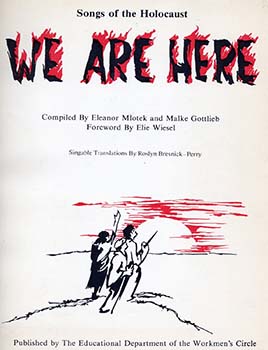Song of Transnistria area in the Ukraine which was occupied by German and Rumanian troops during World War II and was the destination of deported Rumanian Jews. The words of the song were adapted from a pre-war song S’loyfn S’vogn by H. D. Nomberg. Composer and author unknown.

The engine speeds along, clanging as it rides,
Train that roars and tugs,
We, the displaced huddle deep inside —
Riding to the river Bug.
From our own homes we were driven
To a foreign place.
Nothing’s left now there’s no living.
Uprooted and disgraced.
There where the river Dniester’s flowing
Someone’s greeting you,
It’s your mother, it’s your sister,
They are held here too.
Here no grave and here no tombstone
Is prepared for us.
In a mass grave buried, unknown.
Our bodies laid to rest.
This torment will not endure forever.
The war is bound to cease,
And the sunshine night will sever,
We will win the peace.
Es loyfn un klapn di mashinen
Un es fayft der tsug,
Mir, farshikte. zitsn drinen —
Men firt undz tsum bug.
Fun der heymat undz fartribn
In a fremdn land.
Gornisht iz undz mer farblibn,
Mir zaynen farbant.
Dort vu s’flist der breyter dnyester
Shikt a grus dir tsu.
Fun dayn mame, fun dayn shvester
Vos zey zaynen do.
Keyn grub un keyn matseyve
Zaynen far undz do,
In a masngrub a groysn,
Leygt men undz tsu ru . . .
Eybik vet der tsorn nit doyern.
Endikn vet zikh der krig,
Un di zun vet vider shaynen,
Undzerer iz der zig.
עס לױפֿן און קלאַפּן די מאַשינען
און עס פֿײַפֿט דער צוג,
מיר, פֿאַרשיקטע, זיצן דרינען —
מען פֿירט אונדז צום בוג.
פֿון דער הײמאַט אונדז פֿאַרטריבן
אין אַ פֿרעמדן לאַנד,
גאָרנישט איז אונדז מער פֿאַרבליבן,
מיר זײַנען „פֿאַרבאַנט“*.
דאָרט װוּ ס׳פֿליסט דער ברײטער דניעסטער
שיקט אַ גרוס דיר צו,
פֿון דײַן מאַמע, פֿון דײַן שװעסטער,
װאָס זײ זײַנען דאָ.
קײן גרוב און קײן מצבֿה
זײַנען פֿאַר אונדז דאָ,
אין אַ מאַסן–גרוב אַ גרױסן,
לײגט מען אונדז צו רו. . .
אײביק װעט דער צאָרן ניט דױערן
ענדיקן װעט זיך דער קריג
און די זון װעט װידער שײַנען,
אונדזערער איז דער זיג.
_____
*פֿאַרשיקט
Song Title: Lid Fun Bug

Compiled by sisters Malke Gottleib and Chana Mlotek, this collection of 40 songs, issued on the occasion of the 40th anniversary of the Warsaw Ghetto Uprising, reflects the suffering, despair, longing, as well as the strength, hope and courage that led the last remnant of enfeebled Jews to take up arms against the mammoth Nazi war-machine. Save for five songs, this compilation comprises songs that were actually written or sung in the ghettos and concentration camps. Four exceptions written after the war: “Babi Yar,” “Moyshelekh un Shloymelekh,” “Kadish,” and “Mayn mame hot gevolt zayn oyf mayn khasene” are often presented at commemorative gatherings and were therefore included. The fifth song “Am Yisroel Khay” was written in a D.P. camp and is an affirmation of the will of the survivors to build new lives for themselves, holding high their belief in the endurance of the Jewish people. To enable readers and singers not conversant with the Yiddish alphabet to utilize this collection, We Are Here! Songs of the Holocaust provides parallel transliterations and singable English translations by Roslyn Bresnick Perry.